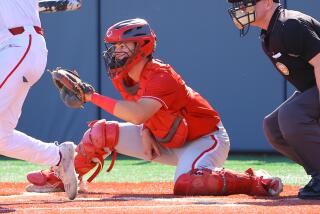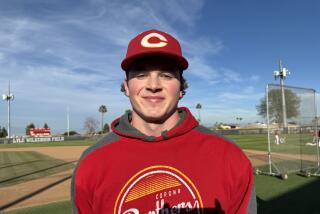Springer Is Just Treading Water in Tidewater
NORFOLK, Va. — Steve Springer’s baseball career had been cruising along at a steady pace during his first four years in the New York Met organization.
Every season, Springer, a former Marina High School and Golden West College infielder, moved up a notch in the farm system, going from rookie ball in 1982 to Class A in 1983, double A in 1984 and triple A in 1985.
But ever since Springer reached Norfolk, home of the triple-A Tidewater Tides, he has hit nothing but roadblocks.
This is his fourth and probably most frustrating season at Tidewater. Here he is, 27 years old with almost seven seasons of professional experience, and he has never played in the major leagues.
Springer, a 6-foot, 190-pounder, has never been invited to a big league spring training camp. He has never been called up in September. He has never had that proverbial cup of coffee in the major leagues.
Heck, he hasn’t even smelled the brew.
The closest Springer, who throws and hits right-handed, has come to Shea Stadium was being mentioned by Met broadcaster Tim McCarver as a possible roster replacement when Met second baseman Tim Teufel injured a hamstring in April.
“That’s my claim to fame,” Springer said.
Springer received several calls from friends in California who had tuned in to the telecast, but he never got the call from the Mets, and he does not appear to fit into their plans.
“I’ve never really felt like a prospect. That’s the indication I’ve gotten here,” Springer said. “They don’t have any plans for me. I’m just helping them out in triple A.”
Springer, who has played outfield, third base, shortstop and second base, has decent statistics at Tidewater. His batting average improved from .261 in 1985 to .273 in 1986 and .281 in 1987 before it dipped to .249 this season.
In 3 1/2 years of triple A, he has hit 19 home runs and 73 doubles and has 173 RBIs. He has fared well against left-handed pitchers but has had problems against right-handed, breaking-ball pitchers. He has struck out at least 72 times in each of the past three seasons, and 50 times this year.
“A .268 lifetime average at Tidewater isn’t bad, and that’s with some serious slumps in there,” Springer said. “But to get to the big leagues, you need one of the tools, either speed or power. I only have a little of both.”
It also hasn’t helped that Springer is in one of baseball’s best organizations--one that is loaded with good infielders.
The Mets have two quality second basemen, Teufel and Wally Backman. It appears that rookie Kevin Elster, who also went to Marina High and Golden West, will be the Mets’ shortstop for years to come. Howard Johnson is the third baseman and can fill in at short.
On the bench, the Mets have versatile infielders Dave Magadan, who can play first or third, and speedy Keith Miller, who can play second, short or third. Miller has been shuttling between New York and Tidewater this season.
Springer’s best position is third base, but he is playing second this season. Why? Because the next Met phenom, 20-year-old Gregg Jefferies, is playing third.
“I really feel that if I was with another organization last year, I would have been called up in September,” said Springer, who was a 20th-round draft pick out of the University of Utah. “That’s the bad thing about being with the Mets. They have so much talent.”
Springer thinks he can be a utility man in the major leagues, and he has asked the Mets to trade him. But Steve Schryver, the Mets’ director of minor league operations, said no major league teams have been interested.
“There would be no shortage of teams that would take Steve at triple-A, but there’s no benefit to a lateral move,” Schryver said. “There hasn’t been any club that has expressed a desire to acquire his services at the major league level.”
Is this discouraging to Springer?
“If they’re telling the truth, it is,” he said.
Mike Cubbage, the Tide manager, said he feels Springer could play major league baseball “in the right situation.” Apparently, that situation isn’t with New York.
But Springer is not ready to give up. He will be a free agent in two months and believes he can catch on with another major league team by next season.
“I look at it positive,” Springer said. “I don’t look at it as, ‘Oh, shoot, I’m 27. I’m too old to make it.’ Sure, I’m too old to make the Hall of Fame. But I’ve got a few good years left.”
Springer, who is engaged to Teri Moore, 28, of Corona del Mar, doesn’t plan to retire from baseball until he is released a few times, even if that means playing triple-A ball again. He’s earning top dollar for a minor leaguer--about $3,600 a month during the season, compared with the $2,000 a month most nonroster triple-A players receive.
“As long as I stay healthy, I won’t quit,” he said. “There’s too much money to be made up there, and I’m not that far away. I love baseball, and I want to coach when I’m done playing. I could always work for my dad, but I’d rather play.”
Springer’s father, Gene, owns a construction company in Long Beach. One of his newest employees is Gary Springer, Steve’s older brother, who recently retired from baseball after six minor league seasons.
Steve rode Gary’s coattails through high school and junior college. He said the only reason he made the freshman team at Marina was that Gary was the star of the varsity team.
As a 4-11, 90-pound infielder, Steve had only three at-bats on the freshman team. He spent one season on the Marina frosh-soph team, one on the junior varsity team and his senior year, 1979, on the varsity, where he hit .210.
No colleges or junior colleges recruited Springer, so he went to Golden West, where Gary was playing. Once again, Steve had just three at-bats his freshman year.
But by his second year at Golden West, Springer had grown to 6-0, 175. He went from a second-string second baseman to an all-conference shortstop and hit .320. He earned a scholarship to Utah and batted .394 as a junior in 1982 before he signed with the Mets.
In his first professional at-bat for the Little Falls, N.Y., Mets, Springer hit a grand slam.
“I thought, ‘Shoot, man, I’m going to the show,’ ” Springer said.
He hasn’t hit prime time yet, but there have been some achievements: In 1983, Springer received the Doubleday Award, given to the most valuable player on each of the Mets’ farm teams, when he hit. 338 with 12 home runs, 24 doubles and 88 RBIs for the Class-A Columbia, S.C., Mets.
He got the last hit off Tom Seaver when he doubled off the center-field wall in Norfolk’s Met Park in May, 1987. Seaver, making what would be his final comeback attempt, was pulled from the game after Springer’s hit, and he retired soon thereafter.
Springer would like to add a few big league memories to that collection, but he doubts that he’ll do so with the Mets.
“I got to Tidewater real fast, but I’ve been in a standstill ever since,” Springer said. “But I wouldn’t trade my ability with some people in the big leagues. All I need is a break.”
More to Read
Go beyond the scoreboard
Get the latest on L.A.'s teams in the daily Sports Report newsletter.
You may occasionally receive promotional content from the Los Angeles Times.











